I think we all know that a great way to learn is through song and dance. I’m sure that you remember some of the nursery rhymes and songs you learned as a child and may have even taught them to your own children! Having taught English in China, I know the power of the song even if it’s in a completely foreign tongue, often aided by actions and animation to emphasise the meaning.
WHY WE SHOULD USE CHINESE SONGS FOR KIDS
Kids Can Relate to Them
Children’s songs usually have themes or narratives that kids understand and enjoy. They often deal with animals, the world around them and subjects that children already know about. They can not only relate to these songs, but they find them fun too.
Songs Use Simple Language
Not only do songs often use simple language and structure that allows children to follow, but this also provides a good opportunity to learn new vocabulary and natural phrases.
Singing words also helps to memorise faster.
Chinese songs for kids that are translated from one language into another, such as Twinkle Twinkle and Happy Birthday, are also a great way for older kids to make the connection between language and meaning.
Words and Phrases are Repeated
In most children’s songs in Chinese and in other languages, words and phrases are repeated over and over again to help with the learning process. We do this with young children even when speaking to them, and this is especially common in spoken Chinese, when doubling nouns can make things sound cute.
Song Have a Short Playing Time
Songs for children tend to be short to cater for short attention spans. Songs that continue over two minutes tend to see kids get bored (from my experience) and distracted.
Kids Love to Sing and Dance
Most children love to sing and dance to almost anything, even if it’s not catered towards them. Children’s songs tend to have a catchy tune and a beat that they can dance around to, picking up some words as they go.
10 Chinese Songs for Kids
Here are 10 songs for kids that you can use for teaching Chinese at home or in the classroom. I’ve included simplified Chinese characters, pinyin and an English translation for each song. The English translation is not a literal translation, but rather a more natural sentence or phrase in English. You can see a literal character translation by clicking each link and visiting our Online Dictionary for a character-by-character translation.
小兔子乖乖 (xiǎo tù zi guāi guāi) Good Little Rabbit
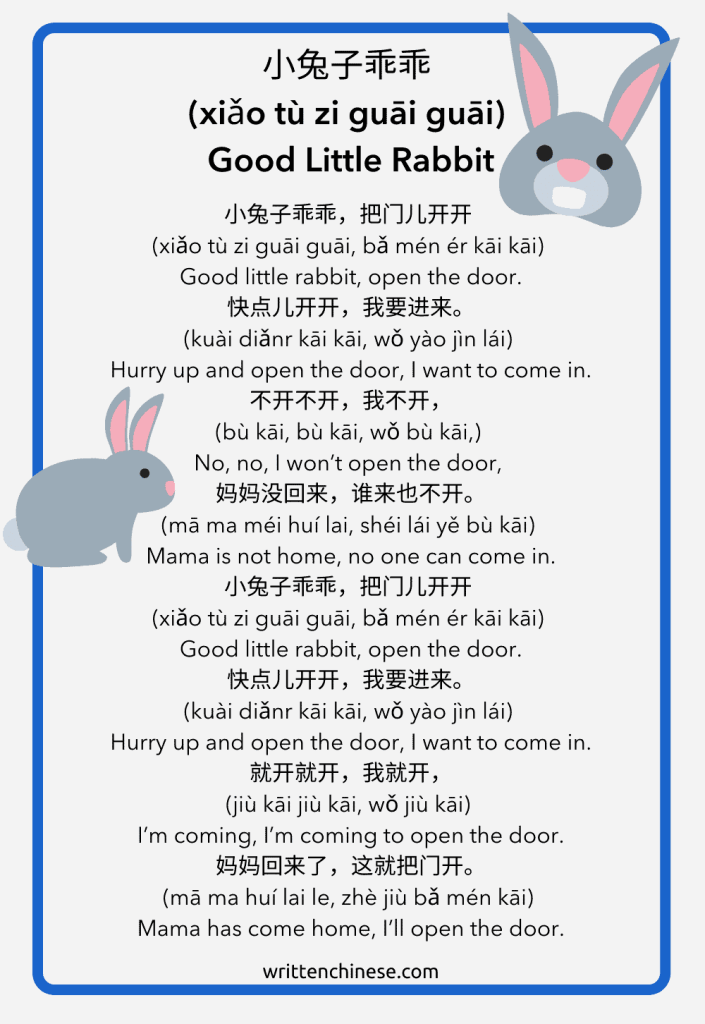
(xiǎo tù zi guāi guāi, bǎ mén ér kāi kāi)
Good little rabbit, open the door.
(kuài diǎnr kāi kāi, wǒ yào jìn lái)
Hurry up and open the door, I want to come in.
(bù kāi, bù kāi, wǒ bù kāi,)
No, no, I won’t open the door,
(mā ma méi huí lai, shéi lái yě bù kāi)
Mama is not home, no one can come in.
(xiǎo tù zi guāi guāi, bǎ mén ér kāi kāi)
Good little rabbit, open the door.
(kuài diǎnr kāi kāi, wǒ yào jìn lái)
Hurry up and open the door, I want to come in.
(jiù kāi jiù kāi, wǒ jiù kāi)
I’m coming, I’m coming to open the door.
(mā ma huí lai le, zhè jiù bǎ mén kāi)
Mama has come home, I’ll open the door.
两只老虎 (liǎng zhī lǎo hǔ) Two Tigers
Sometimes, 耳朵 or ‘ears’ are replaced by 眼睛 ‘eyes’ in some versions of this song.
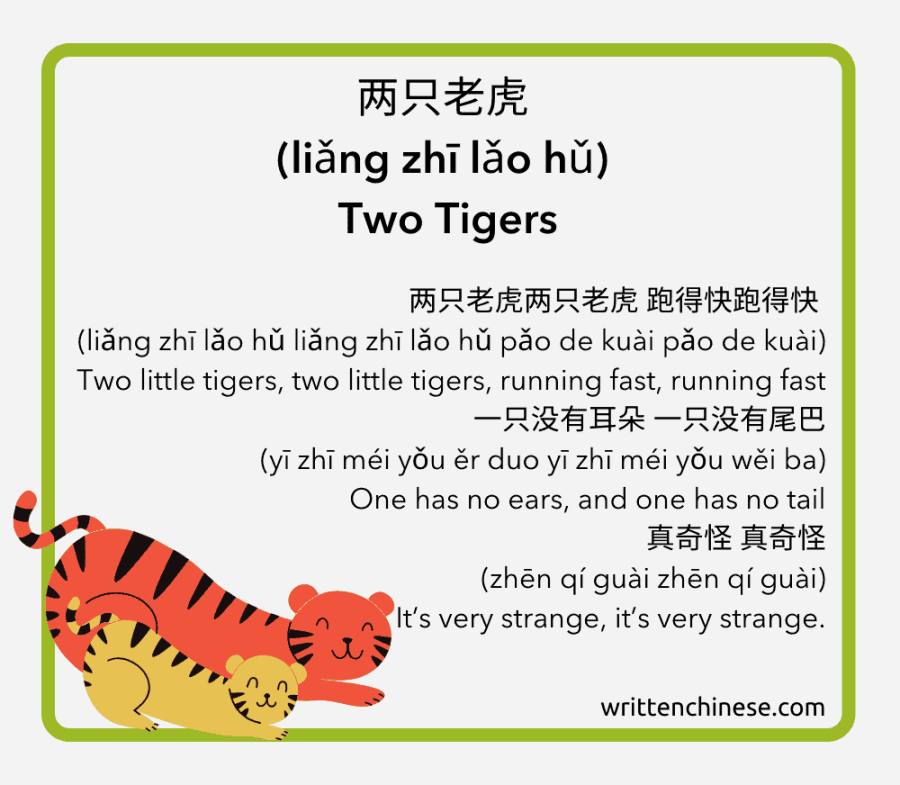
(liǎng zhī lǎo hǔ liǎng zhī lǎo hǔ pǎo de kuài pǎo de kuài)
Two little tigers, two little tigers, running fast, running fast
(yī zhī méi yǒu ěr duo yī zhī méi yǒu wěi ba)
One has no ears, and one has no tail
(zhēn qí guài zhēn qí guài)
It’s very strange, it’s very strange.
REPEAT
小手拍拍 (xiǎo shǒu pāi pāi) Clap Your Hands
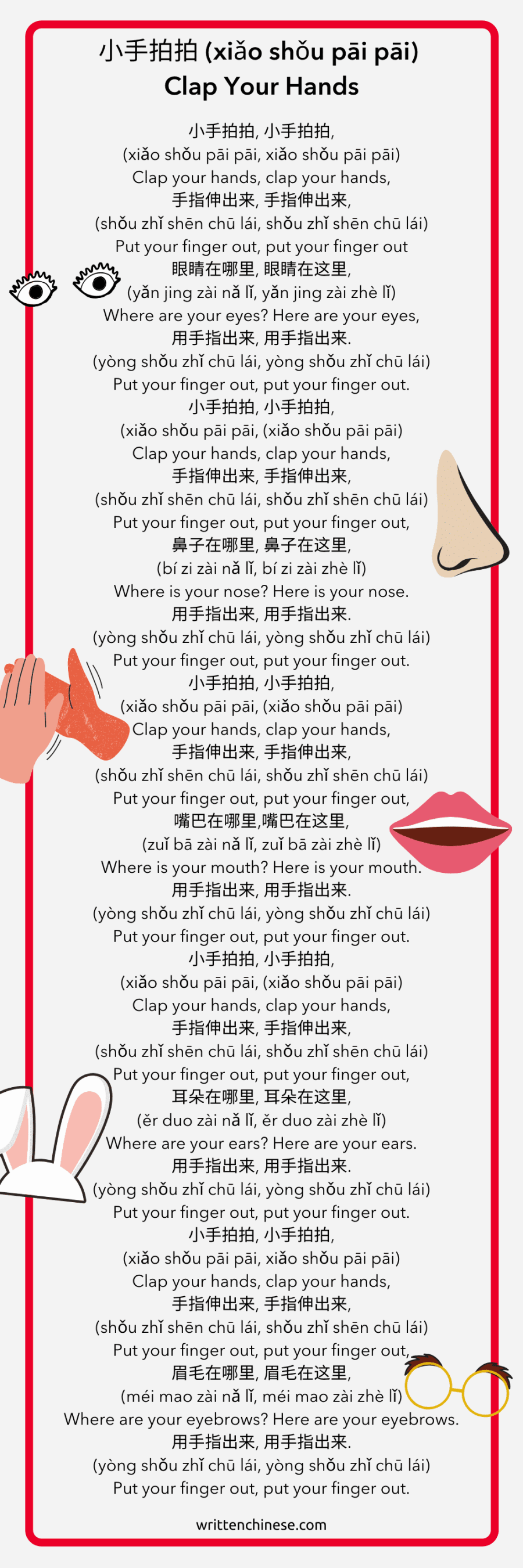
(xiǎo shǒu pāi pāi, (xiǎo shǒu pāi pāi)
Clap your hands, clap your hands,
(shǒu zhǐ shēn chū lái, shǒu zhǐ shēn chū lái)
Put your finger out, put your finger out
(yǎn jing zài nǎ lǐ, yǎn jing zài zhè lǐ)
Where are your eyes? Here are your eyes,
(yòng shǒu zhǐ chū lái, yòng shǒu zhǐ chū lái)
Put your finger out, put your finger out.
(xiǎo shǒu pāi pāi, (xiǎo shǒu pāi pāi)
Clap your hands, clap your hands,
(shǒu zhǐ shēn chū lái, shǒu zhǐ shēn chū lái)
Put your finger out, put your finger out,
(bí zi zài nǎ lǐ, bí zi zài zhè lǐ)
Where is your nose? Here is your nose.
(yòng shǒu zhǐ chū lái, yòng shǒu zhǐ chū lái)
Put your finger out, put your finger out.
(xiǎo shǒu pāi pāi, (xiǎo shǒu pāi pāi)
Clap your hands, clap your hands,
(shǒu zhǐ shēn chū lái, shǒu zhǐ shēn chū lái)
Put your finger out, put your finger out,
(zuǐ bā zài nǎ lǐ, zuǐ bā zài zhè lǐ)
Where is your mouth? Here is your mouth.
(yòng shǒu zhǐ chū lái, yòng shǒu zhǐ chū lái)
Put your finger out, put your finger out.
(xiǎo shǒu pāi pāi, (xiǎo shǒu pāi pāi)
Clap your hands, clap your hands,
(shǒu zhǐ shēn chū lái, shǒu zhǐ shēn chū lái)
Put your finger out, put your finger out,
(ěr duo zài nǎ lǐ, ěr duo zài zhè lǐ)
Where are your ears? Here are your ears.
(yòng shǒu zhǐ chū lái, yòng shǒu zhǐ chū lái)
Put your finger out, put your finger out.
(xiǎo shǒu pāi pāi, (xiǎo shǒu pāi pāi)
Clap your hands, clap your hands,
(shǒu zhǐ shēn chū lái, shǒu zhǐ shēn chū lái)
Put your finger out, put your finger out,
(méi mao zài nǎ lǐ, méi mao zài zhè lǐ)
Where are your eyebrows? Here are your eyebrows.
(yòng shǒu zhǐ chū lái, yòng shǒu zhǐ chū lái)
Put your finger out, put your finger out.
拔萝卜 (bá luó bo) Pull the Radish
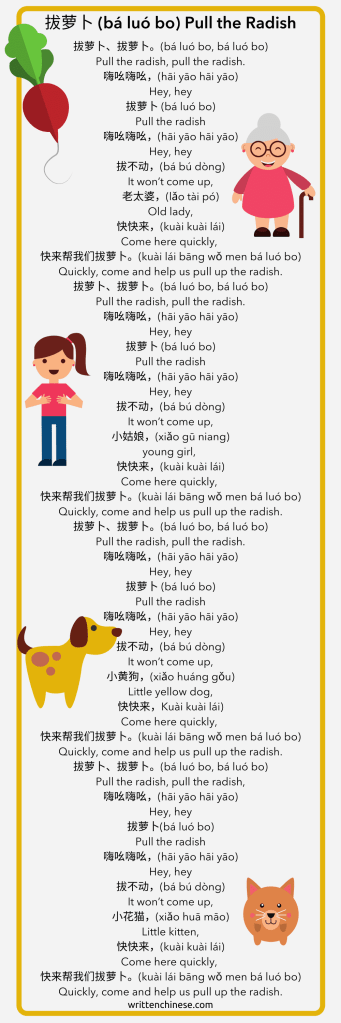
(bá luó bo, bá luó bo)
Pull the radish, pull the radish.
嗨吆嗨吆,
(hāi yāo hāi yāo)
Hey, hey
(bá luó bo)
Pull the radish
嗨吆嗨吆,
(hāi yāo hāi yāo)
Hey, hey
拔不动,
(bá bú dòng)
It won’t come up,
老太婆,
(lǎo tài pó)
Old lady,
快快来,
Kuài kuài lái)
Come here quickly,
(kuài lái bāng wǒ men bá luó bo)
Quickly, come and help us pull up the radish.
(bá luó bo, bá luó bo)
Pull the radish, pull the radish.
嗨吆嗨吆,
(hāi yāo hāi yāo)
Hey, hey
(bá luó bo)
Pull the radish
嗨吆嗨吆,
(hāi yāo hāi yāo)
Hey, hey
拔不动,
(bá bú dòng)
It won’t come up,
小姑娘,
(xiǎo gū niang)
young girl,
快快来,
Kuài kuài lái)
Come here quickly,
(kuài lái bāng wǒ men bá luó bo)
Quickly, come and help us pull up the radish.
(bá luó bo, bá luó bo)
Pull the radish, pull the radish.
嗨吆嗨吆,
(hāi yāo hāi yāo)
Hey, hey
(bá luó bo)
Pull the radish
嗨吆嗨吆,
(hāi yāo hāi yāo)
Hey, hey
拔不动,
(bá bú dòng)
It won’t come up,
小黄狗,
(xiǎo huáng gǒu)
Little yellow dog,
快快来,
Kuài kuài lái)
Come here quickly,
(kuài lái bāng wǒ men bá luó bo)
Quickly, come and help us pull up the radish.
(bá luó bo, bá luó bo)
Pull the radish, pull the radish.
嗨吆嗨吆,
(hāi yāo hāi yāo)
Hey, hey
(bá luó bo)
Pull the radish
嗨吆嗨吆,
(hāi yāo hāi yāo)
Hey, hey
拔不动,
(bá bú dòng)
It won’t come up,
小花猫,
(xiǎo huā māo)
Little kitten,
快快来,
Kuài kuài lái)
Come here quickly,
(kuài lái bāng wǒ men bá luó bo)
Quickly, come and help us pull up the radish.
REPEAT
数鸭子 (shù yā zi) Counting Ducks
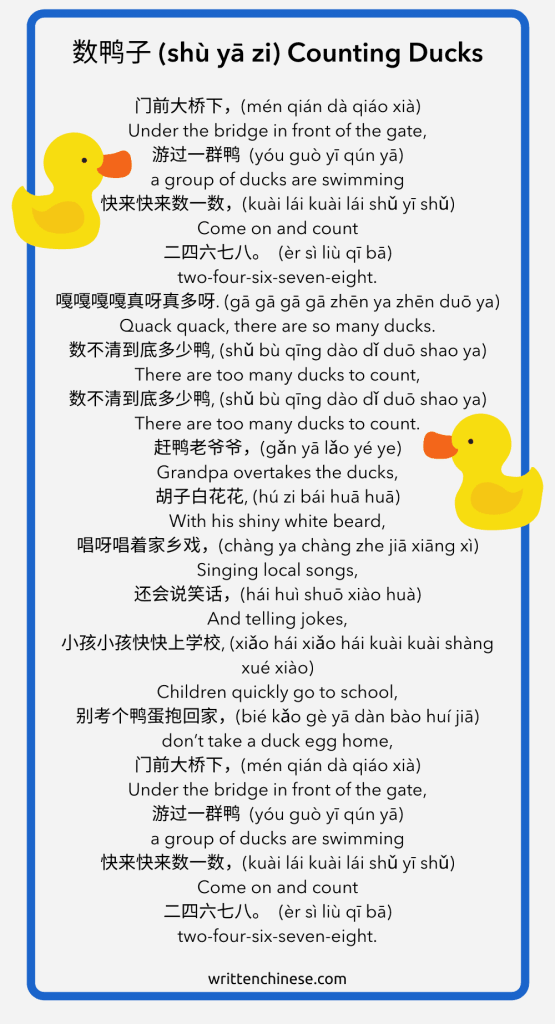
(mén qián dà qiáo xià)
Under the bridge in front of the gate,
(yóu guò yī qún yā)
a group of ducks are swimming
(kuài lái kuài lái shǔ yī shǔ)
Come on and count
(èr sì liù qī bā)
two-four-six-seven-eight.
(gā gā gā gā zhēn ya zhēn duō ya)
Quack quack, there are so many ducks.
(shǔ bù qīng dào dǐ duō shao ya)
There are too many ducks to count,
(shǔ bù qīng dào dǐ duō shao ya)
There are too many ducks to count.
(gǎn yā lǎo yé ye)
Grandpa overtakes the ducks,
(hú zi bái huā huā)
With his shiny white beard,
(chàng ya chàng zhe jiā xiāng xì)
Singing local songs,
(hái huì shuō xiào huà)
And telling jokes,
(xiǎo hái xiǎo hái kuài kuài shàng xué xiào)
Children quickly go to school,
(bié kǎo gè yā dàn bào huí jiā)
don’t take a duck egg home,
(mén qián dà qiáo xià)
Under the bridge in front of the gate,
(yóu guò yī qún yā)
a group of ducks are swimming
(kuài lái kuài lái shǔ yī shǔ)
Come on and count
(èr sì liù qī bā)
two-four-six-seven-eight.
找朋友 (zhǎo péng you) Find a Friend
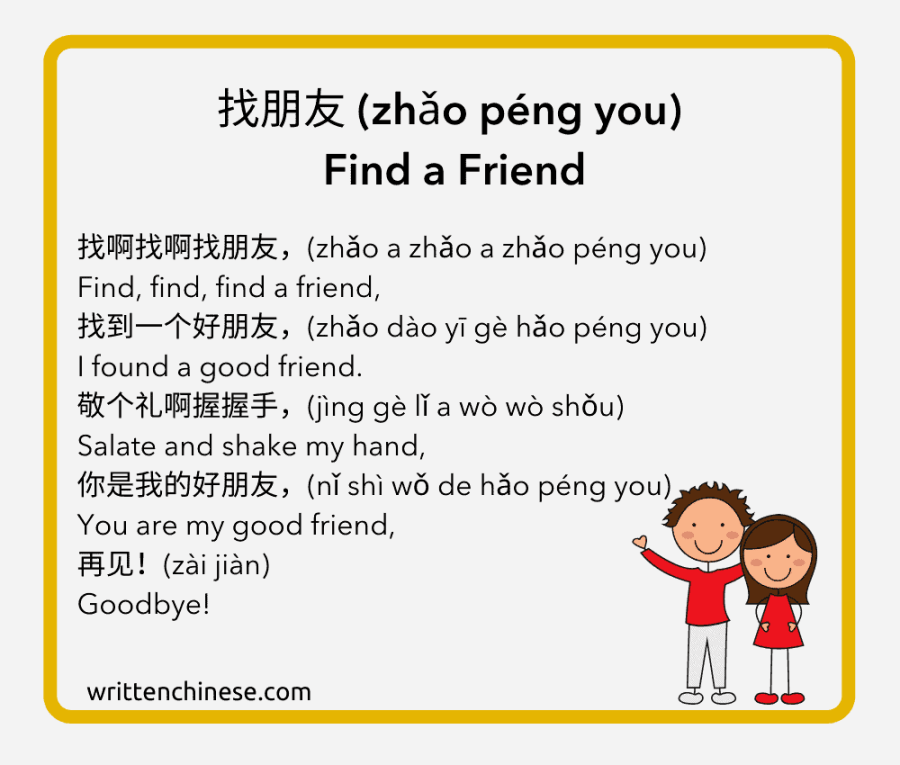
(zhǎo a zhǎo a zhǎo péng you)
Find, find, find a friend,
(zhǎo dào yī gè hǎo péng you)
I found a good friend.
(jìng gè lǐ a wò wò shǒu)
Salate and shake my hand,
(nǐ shì wǒ de hǎo péng you)
You are my good friend,
再见!
(zài jiàn)
Goodbye!
小星星 (xiǎo xīng xing) (Twinkle Twinkle) Little Star
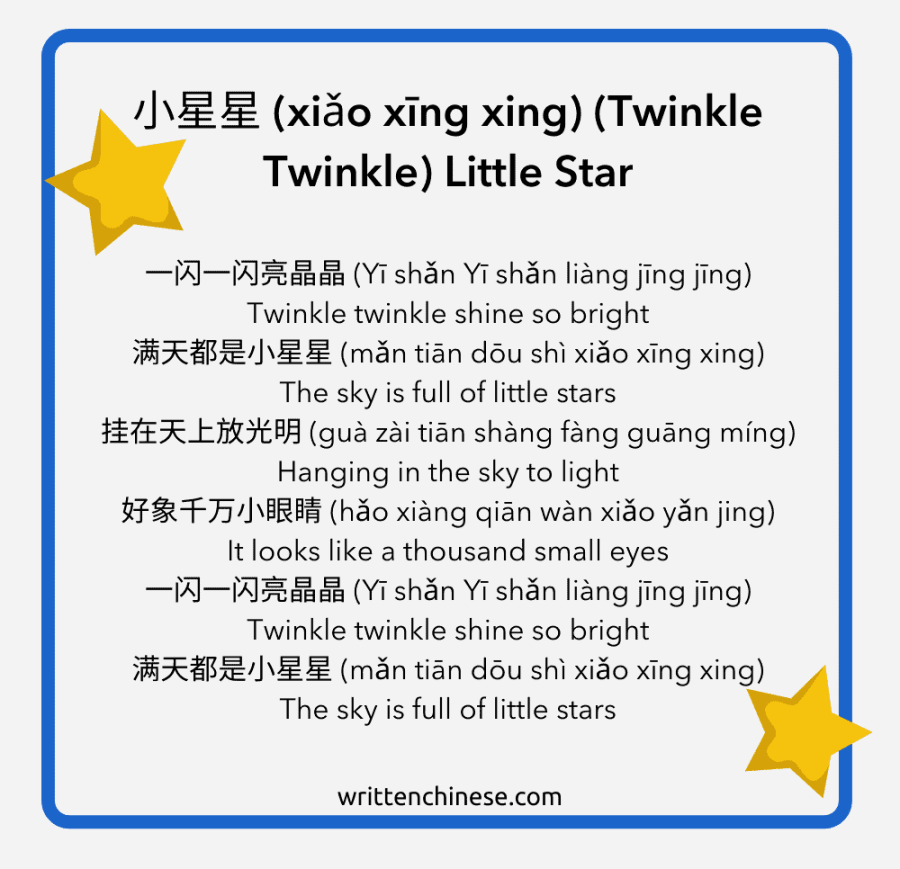
(Yī shǎn Yī shǎn liàng jīng jīng)
Twinkle twinkle shine so bright
(mǎn tiān dōu shì xiǎo xīng xing)
The sky is full of little stars
(guà zài tiān shàng fàng guāng míng)
Hanging in the sky to light
(hǎo xiàng qiān wàn xiǎo yǎn jing)
It looks like a thousand small eyes
(Yī shǎn Yī shǎn liàng jīng jīng)
Twinkle twinkle shine so bright
(mǎn tiān dōu shì xiǎo xīng xing)
The sky is full of little stars
Twinkle, twinkle, little star,
How I wonder what you are.
Up above the world so high,
Like a diamond in the sky.
Twinkle, twinkle, little star.
How I wonder what you are.
三只熊 (sān zhī xióng) 3 Bears
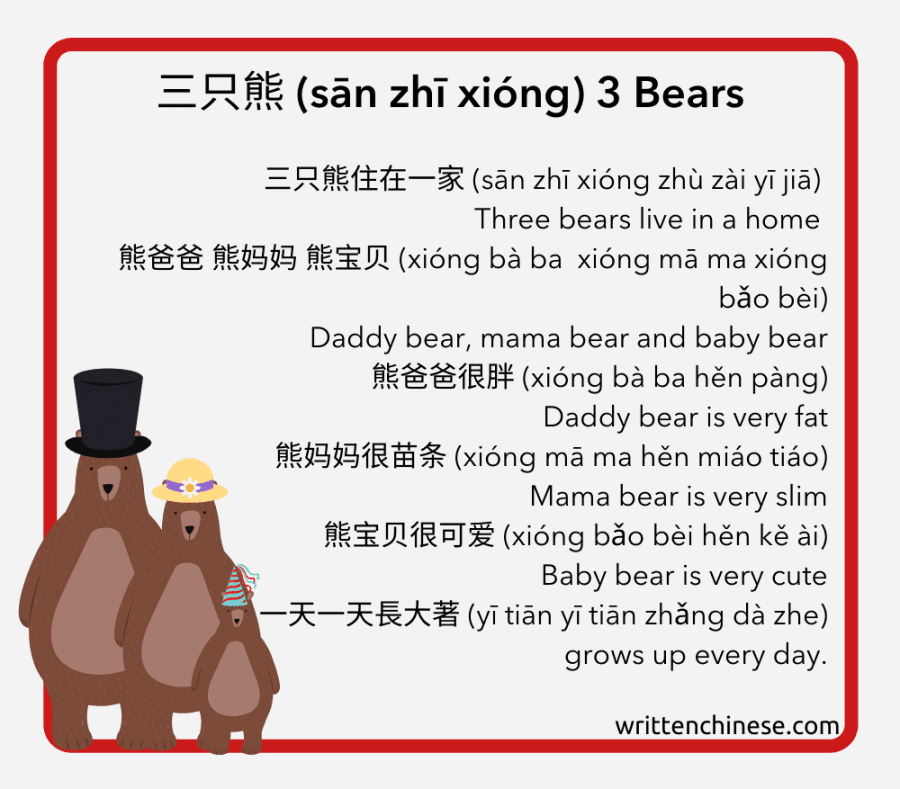
(sān zhī xióng zhù zài yī jiā)
Three bears live in a home
(xióng bà ba xióng mā ma xióng bǎo bèi)
Daddy bear, mama bear and baby bear
(xióng bà ba hěn pàng)
Daddy bear is very fat
(xióng mā ma hěn miáo tiáo)
Mama bear is very slim
(xióng bǎo bèi hěn kě ài)
Baby bear is very cute
(yī tiān yī tiān zhǎng dà zhe)
grows up every day.
虫儿飞 (chóng er fēi) Flying Insects
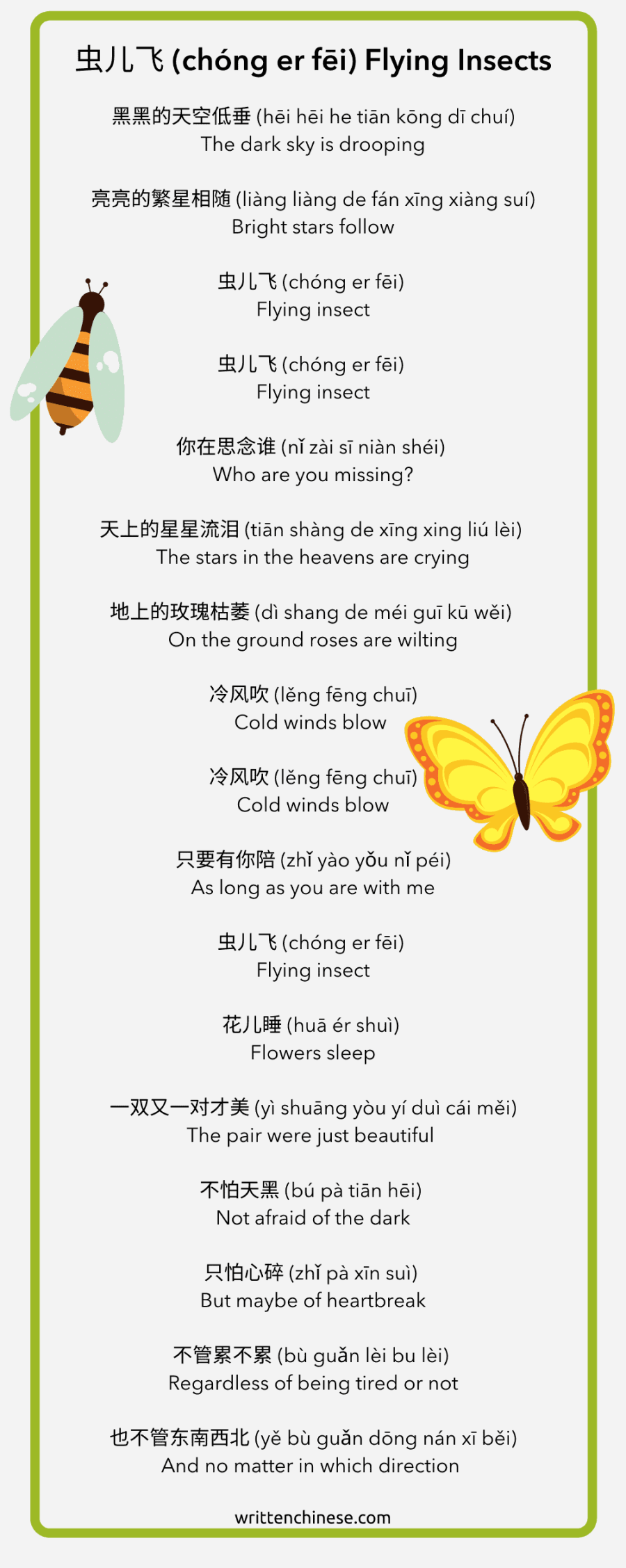
(hēi hēi he tiān kōng dī chuí)
The dark sky is drooping
(liàng liàng de fán xīng xiàng suí)
Bright stars follow
(chóng er fēi)
Flying insect
(chóng er fēi)
Flying insect
(nǐ zài sī niàn shéi)
Who are you missing?
(tiān shàng de xīng xing liú lèi)
The stars in the heavens are crying
(dì shang de méi guī kū wěi)
On the ground roses are wilting
(lěng fēng chuī)
Cold winds blow
(lěng fēng chuī)
Cold winds blow
(zhǐ yào yǒu nǐ péi)
As long as you are with me
(chóng er fēi)
Flying insect
(huā ér shuì)
Flowers sleep
(yì shuāng yòu yí duì cái měi)
The pair were just beautiful
(bú pà tiān hēi)
Not afraid of the dark
(zhǐ pà xīn suì)
But maybe of heartbreak
(bù guǎn lèi bu lèi)
Regardless of being tired or not
(yě bù guǎn dōng nán xī běi)
And no matter in which direction
祝你生日 (shēng rì kuài lè) Happy Birthday
Learn more about how birthdays are celebrated in China, including gifts to buy (any not to buy) and food to eat!
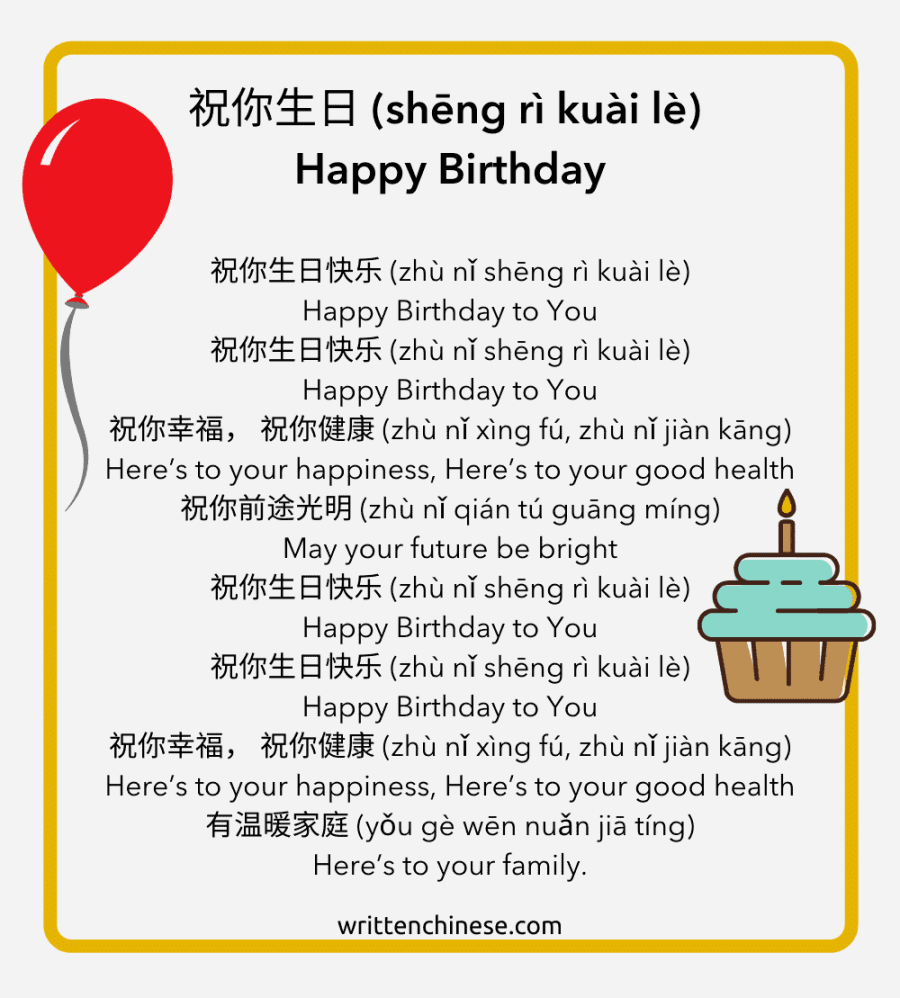
(zhù nǐ shēng rì kuài lè)
Happy Birthday to You
(zhù nǐ shēng rì kuài lè)
Happy Birthday to You
(zhù nǐ xìng fú, zhù nǐ jiàn kāng)
Here’s to your happiness, Here’s to your good health
(zhù nǐ qián tú guāng míng)
May your future be bright
(zhù nǐ shēng rì kuài lè)
Happy Birthday to You
(zhù nǐ shēng rì kuài lè)
Happy Birthday to You
(zhù nǐ xìng fú, zhù nǐ jiàn kāng)
Here’s to your happiness, Here’s to your good health
(yǒu gè wēn nuǎn jiā tíng)
Here’s to your family.
Want to continue listening to Chinese songs for kids? Then check out this Spotify playlist of songs and rhymes specifically for children.
Share your own Chinese songs and nursery rhymes for children with us in the comments below!
